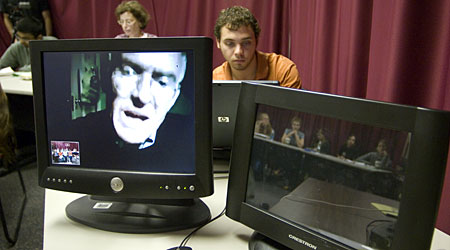![]() Geology professor Connie Soja and 13 students in her Core Distinction course recently had a “wonderful conversation” with the great-great grandson of Charles Darwin, even though some 3,444 miles separated the participants.
Geology professor Connie Soja and 13 students in her Core Distinction course recently had a “wonderful conversation” with the great-great grandson of Charles Darwin, even though some 3,444 miles separated the participants.
Soja’s students could see and interact with Randal Keynes, who spoke to them via a software program called Skype and whose image was projected on a screen in 209 McGregory, a room specially outfitted to handle video conferences.
Keynes also was able to see each student who posed questions about his famous relative, the English scientist who rocked the world with his theory of evolution.
Keynes’s book about Darwin, Annie’s Box, is one of the books being used in Soja’s Darwin and the Victorian Age of Discovery course. The book is being made into a major motion picture.
Molly Kimball ’08 called the video conference a “phenomenal supplement to what we’re doing in the classroom.”
“Being able to talk with him really made it concrete, his ideas that we had read about in the book,” she said. “He was really accessible as a person, too, so it was great to get his personal opinions about questions we’ve discussed in class.”
 |
| Randal Keynes is seen on a computer monitor in 209 McGregory. His image also was displayed on a large screen for all students to see. Mike Roberts (right), ITS multimedia systems technician, set up the video conference. (Photo by Timothy D. Sofranko) |
Keynes, who spoke from his London home on Oct. 25, had spent a day with Soja and students in an off-campus study group she led in 2002.
Soja noted how Keynes’s comments shed light on Darwin and his writings, which were intended not just for scientists, but for the general population.
“This is especially important for our Core Distinction course, where this interdisciplinary focus allows students from different concentrations, scientists and non-scientists alike, to understand the impact Darwin’s ideas had in the past and today,” she said.
Soja wants to conduct more video conferences with authors of books she uses in class.
“This facility (209 McGregory) is amazing and the technology makes this so easy,” she said.